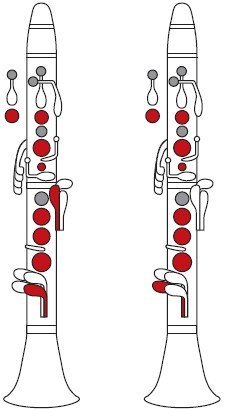The Gb Major Pentatonic scale has a fascinating history that resonates deeply within the clarinet's repertoire. Often overlooked, this scale offers a wealth of musical possibilities that have won the hearts of composers and performers alike. You might ask, “What makes the Gb Major Pentatonic scale so special in clarinet music?” Let's explore its historical significance and its lasting impact on music as a whole!

Clarinet Fingering Charts are always FREE at MartinFreres.net!
First off, let's break down the scale. The Gb Major Pentatonic scale comprises five notes: Gb, Ab, Bb, Db, and Eb. These notes create a unique flavor, blending major and minor tonalities that can stir various emotions. The absence of certain intervals makes it particularly interesting, allowing for melodies that are both memorable and adaptable to many styles. You know, hitting the right emotional notes can make all the difference when performing!
Historical Significance of Gb Major Pentatonic Scale
Over time, many notable composers have used the Gb Major Pentatonic scale in their works, recognizing its special tonal qualities. From classical to contemporary music, this scale has found its way into numerous compositions, enhancing the clarinet's voice-like quality. Think back to the jazz era—the improvisational style of jazz musicians often has its roots in pentatonic scales. This scale has inspired countless improvisations, showing just how flexible it can be. Imagine the musical landscapes a skilled clarinetist can create using these notes!
| Musical Era | Influence of Gb Major Pentatonic Scale |
|---|---|
| Classical | Incorporated into complex compositions |
| Jazz | Basis for improvisation and solos |
| Folk | Used in traditional melodies across cultures |
| Contemporary | Integrated into modern compositions for unique sounds |
Folk Music and Pentatonic Scales
In folk music, the Gb Major Pentatonic scale has its own story. Many cultures worldwide use pentatonic scales, as they often bring a sense of familiarity and warmth. When played on the clarinet, these folk tunes come to life with stories and feelings. Playing a folk song on your clarinet can make you feel connected to something bigger, linking you to tradition and history.
Improvisation and Gb Major Pentatonic
It's fascinating to see how the Gb Major Pentatonic scale relates to improvisation! Jazz clarinetists, especially, love this scale for its potential in spontaneous creation. The freedom to explore melodies, patterns, and harmonies without the limits of more complex scales allows for a more expressive performance. Picture this: a clarinetist, totally in the moment, creating a musical tapestry that grabs the audience's attention. There's an art to this kind of improvisation that's truly remarkable.
Learning and Practicing
For students learning the clarinet, using the Gb Major Pentatonic scale can create a strong foundation. As beginners, starting with this simpler scale can boost confidence when moving on to harder scales and more complex pieces. Plus, it lets students play around with melodies and train their ear for music. After all, learning should be fun as well as educational. And who doesn't enjoy a good tune?
Interestingly, even experienced musicians encourage their students to experiment with this scale in their practice sessions. Whether making up a solo or playing with a band, the Gb Major Pentatonic scale is both easy to use and versatile. It gives singers a chance to shine, too! You can almost hear their voices mixing with the rich sounds of the clarinet.
Contemporary Use
In today's music, the Gb Major Pentatonic scale is still important. Modern composers aren't just copying old techniques; they connect with the heart of this scale, using it to spark new ideas and themes. Mixing traditional and modern ideas boosts creativity, creating a conversation between generations. And isn't that what music is about? Sharing stories, emotions, and experiences through sound?
Versatility Across Genres
Another key point is how the clarinet can express different musical styles using the Gb Major Pentatonic scale. From classical solos to jazz groups and even modern collaborations, this scale crosses genres, making it popular among clarinetists from all backgrounds. It's like having a trusted friend with you while trying new styles—familiar but excitingly new!
Conclusion
To wrap up, the Gb Major Pentatonic scale has secured its place as a key part of clarinet music's history. From its simple melodies to its use across genres, this scale gives musicians endless chances to explore, create, and express themselves. So, why not pick up your clarinet and find your voice through this amazing scale? Let the music flow!
Table of Contents
- Historical Significance of Gb Major Pentatonic Scale
- Folk Music and Pentatonic Scales
- Improvisation and Gb Major Pentatonic
- Learning and Practicing
- Contemporary Use
- Versatility Across Genres
- Conclusion








